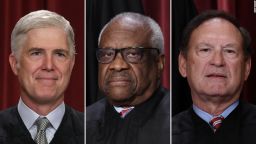As the Supreme Court deliberates behind closed doors over a case that many believe could be one of the most consequential voting rights disputes ever to reach the high court, the Justice Department and some other parties involved are suggesting the case be dismissed due to major developments since oral arguments.
If the justices were to ultimately remove the case from the docket it would sidestep a major dispute over the so-called the Independent State Legislature theory pushed by conservatives and supporters of former President Donald Trump after the 2020 election for now.
The case has captured the nation’s attention, because Republican lawmakers in North Carolina are asking the justices to adopt a long dormant legal theory and rule that state courts and other state entities have a limited role in reviewing election rules established by state legislatures when it comes to federal elections.
Critics say the Independent State Legislature theory could revolutionize electoral politics going forward if fully adopted and could lead to state legislatures having absolute authority in the area without the necessary judicial oversight.
The actual case before the justices presents a redistricting dispute out of North Carolina, involving a North Carolina Supreme Court decision from February 2002 that invalided the state’s congressional map. The state Supreme Court struck the map as an illegal partisan gerrymander and replaced it with a temporary court-drawn map more favorable to Democrats.
The Supreme Court heard oral arguments in the GOP’s appeal of that decision in December. At arguments, a lawyer for the lawmakers asked the justices to adopt the Independent State Legislature theory, and some of the justices appeared to express some support for a version of the doctrine.
But after the case was argued, and before the justices have rendered an opinion, new developments occurred on the ground in North Carolina.
That’s because after the last election, the North Carolina Supreme Court flipped its majority to Republican. In February, the newly composed state Supreme Court announced it had voted to take the unusual step and rehear a dispute concerning the maps.
That development prompted the US Supreme Court to ask the parties on both sides to explain whether the justices still had the authority to hear the case or whether it should be dismissed. Central to the question is whether the state court has issued a “final judgment” in the case clearing the way for US Supreme Court review.
Solicitor General Elizbeth Prelogar told the justices in a letter Monday that the NC decision grant of rehearing “makes it difficult to conclude that the state court has entered a final judgement.”
At the same time, Prelogar acknowledged the maneuvering had created a “novel” predicament and the justices “could reasonably reach a different conclusion.”
An attorney for the state of North Carolina, which is also opposed to the Republican lawmakers’ stance in the case, agreed the case should be dismissed. Sarah G. Boyce of the North Carolina Department of Justice stressed that the US Supreme Court cannot step in now because, “further proceedings remain”.
But Common Cause, a group that opposes the GOP lawmakers, disagreed with the position taken by its own side and urged the justices to decide the case.
Neal Katyal, a lawyer for the group, stressed that the court should use the North Carolina case to decide the Independent State Legislature doctrine issue rather than wait until it arises again on an emergency basis “during the 2024 election cycle.”
And his opponent, David Thompson, a lawyer for the North Carolina Republican lawmakers, agreed on that point.
He argued in his letter that the justices still have jurisdiction because the North Carolina Supreme Court decision was final, and the re-hearing order is directed at subsequent decisions made by the state high court.
“This court is therefore fully possessed of jurisdiction to decide” the case, Thompson wrote.
If the US Supreme Court ultimately decides to dismiss the case out of North Carolina, it will likely be asked in short order to take up the same kind of dispute brought by a different party. Ohio’s attorney general, for instance has a pending request with the court to take up a similar dispute.



